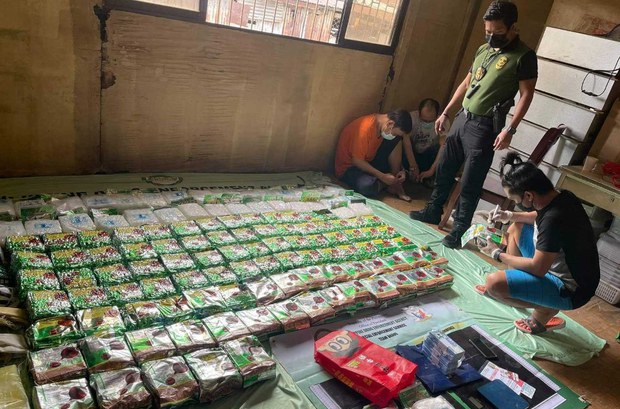Philippine Leader Applauds Drug Enforcers for Huge Crystal Meth Haul
2021.08.03
Manila
 Philippine Drug Enforcement Agency officers inspect crystal meth packaged in tea packets seized during three drug raids, Aug. 1, 2021.
Philippine Drug Enforcement Agency officers inspect crystal meth packaged in tea packets seized during three drug raids, Aug. 1, 2021.
Philippine President Rodrigo Duterte during his weekly national briefing remained defiant about his administration’s deadly war on drugs, while applauding law enforcers for raids that led to the largest haul of methamphetamine this year and the death of a Chinese suspect.
At a televised late-night cabinet meeting on Monday, Duterte, 76, showed photos from the haul as he congratulated police and the Philippine Drug Enforcement Agency for three operations that culminated in the seizure of crystal meth valued at 1.4 billion pesos (U.S. $28.2 million).
“To the team, from the different agencies, police, PDEA, Army, the intelligence community, I’d like to commend you. Congratulations,” he said.
The Philippine leader also vowed to never appear alive before an international court investigating his controversial drug war, which has left more than 8,000 dead, according to official figures that activists say do not capture the actual toll.
On Monday, the Philippine Drug Enforcement Agency reported that four suspected traffickers were arrested and a suspect identified as a Chinese national was killed during the course of the counter-narcotics operations in different areas of Metro Manila a day earlier. The raids led to the seizure of more than 200 kg (440 pounds) of crystal meth concealed in tea packets, along with mobile phones and at least one gun.
The Chinese national, identified as Wu Zishen, 50, was killed during a shootout in the town of Balagtas, but his accomplice, Chen Hongli, managed to escape, according to a statement from the PDEA.
Three other Chinese nationals, identified as Chen Bien (alias Wille Lu Tan), 42; Wang Min (alias Antong Wong), 28; and Chen Zhin, 79; were arrested in suburban Quezon City, the agency said. A fourth suspect, Joseph Dy, whose nationality was not released, was arrested in a raid in Valenzuela City.
'Shared values'
Last week, ahead of a maiden visit to the Philippines by U.S. Secretary of Defense Lloyd Austin, 10 American senators called for an investigation of the Philippine government over its war on drugs, in a letter to U.S. Secretary of State Antony Blinken. During the visit, the two nations reaffirmed a military pact that allows U.S. troops to conduct drills and exercises in Philippine territory.
Sen. Edward Markey and nine other Democrats expressed concern about the human rights situation in the Philippines, while seeking “to better understand the Biden administration’s strategy for addressing the Duterte government’s continuing pattern of human rights violations.”
Dated July 26, the senators’ letter told Blinken that maintaining a bilateral relationship required upholding shared values, including the protection of human rights.
“Yet, Philippine President Rodrigo Duterte has waged a multi-year extrajudicial, violent, and inhumane ‘war on drugs’ that has devastated communities,” the senators wrote.
Late Monday, in an apparent response to the letter, Duterte challenged Washington’s human rights record.
“I’d like to say something about the State Department. Be careful. Be careful of what you are planning or doing there because you yourself, your country is – not just was – is guilty of so many violations of human rights,” Duterte said, without detailing specific violations.
The U.S. State Department did not respond to a request for comment about the senators' letter. But Philippine presidential spokesman Harry Roque did reply when asked how the U.S. government should respond.
“We leave that decision to President Joe Biden. They are Americans. In the same way that we don’t like for them to comment on what the Philippine Congress is doing, we would also not interfere,” Roque said in a statement on Monday.
“That is, anyway, a personal view of 10 American senators. We leave it up to them whatever they want to do.”
Five-year drug war
Duterte launched his drug war soon after becoming president in 2016. He had campaigned for office on a pledge of ridding the Philippines of the scourge of illegal drugs and drug addiction. He even promised to turn Manila Bay red with the bodies of dead drug suspects.
Since he took power, at least 8,000 suspected dealers and addicts have died in police operations, according to government figures, while rights groups claim that the number could be thousands more when including extrajudicial killings blamed on vigilantes linked to the government.
Fatou Bensouda, the then-top prosecutor of The Hague-based International Criminal Court (ICC), announced in June that she was seeking a probe into allegations that crimes against humanity took place under Duterte’s drug war. A day before leaving her post, she announced the investigation would cover the period from when Duterte took office on June 30, 2016, until March 2019.
“Over my dead body. You can get me and bring me to the Netherlands dead,” Duterte said on Monday, in his latest diatribe against the investigation. “You will have a carcass. I will not go there alive, you fools.”
In 2019, Duterte pulled the Philippines out of an international treaty that created the ICC. Despite that action, the Philippine Supreme Court earlier this year ruled that Duterte could face trial at the ICC.
During his final State of the Nation Address on July 26, the president delivered another defiant message against the ICC.
“I never denied – and the ICC can record it – those who destroy my country, I will kill you, and those who destroy the young people of my country, I will kill you, because I love my country,” he said at the time.







